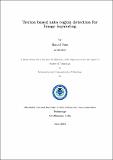Please use this identifier to cite or link to this item:
http://drsr.daiict.ac.in//handle/123456789/380| Title: | Texton based auto region detection for image inpainting |
| Authors: | Joshi, Manjunath V. Vora, Manali |
| Keywords: | Image Processing Denoising Image Denoising Algorithms Inpainting Algorithms Digital techniques |
| Issue Date: | 2012 |
| Publisher: | Dhirubhai Ambani Institute of Information and Communication Technology |
| Citation: | Vora, Manali (2012). Texton based auto region detection for image inpainting. Dhirubhai Ambani Institute of Information and Communication Technology, viii, 40 p. (Acc.No: T00343) |
| Abstract: | Historical monuments are considered as one of the key aspects for modern communities. Unfortunately, because of variety of factors these monuments are sometimes damaged or destroyed. Image inpainting is the process of restoring the damaged image and hence can be used as a useful tool for restoring the images of historical monumnets. Inpainting techniques developed so far require the user to manually select regions to be inpainted. In this thesis, we propose a novel approach for automatic region detection for inpainting. Given a frontal face test image and a set of face images of monument consisting of vandalized and nonvandalized regions, our task is to: 1. extract potential regions of interest like eyes, nose and lips, 2. identify whether a particular region is vandalized or not and 3. inpaint the vandalized regions using the available non-vandalized regions. In our approach, potential regions of interest are rst localized using the bilateral symmetry based method, while the identication of vandalized and non-vandalized regions is done based on the texture statistics. The texture statistics are obtained by extracting the textons from the lter response space by using the Kmeans algorithm. After identifying vandalized regions, Poisson image editing technique is used to inpaint them using the non-vandalized regions available either in the same image or from the other images in the database. Novelty of our approach lies in 1. automatic detection of target regions for inpaiting and 2. automatic selection of optimum number of textons. Experiments conducted on the frontal face images of monuments downloaded from the Internet give promising results |
| URI: | http://drsr.daiict.ac.in/handle/123456789/380 |
| Appears in Collections: | M Tech Dissertations |
Files in This Item:
| File | Description | Size | Format | |
|---|---|---|---|---|
| 201011005.pdf Restricted Access | 2.16 MB | Adobe PDF |  View/Open Request a copy |
Items in DSpace are protected by copyright, with all rights reserved, unless otherwise indicated.
